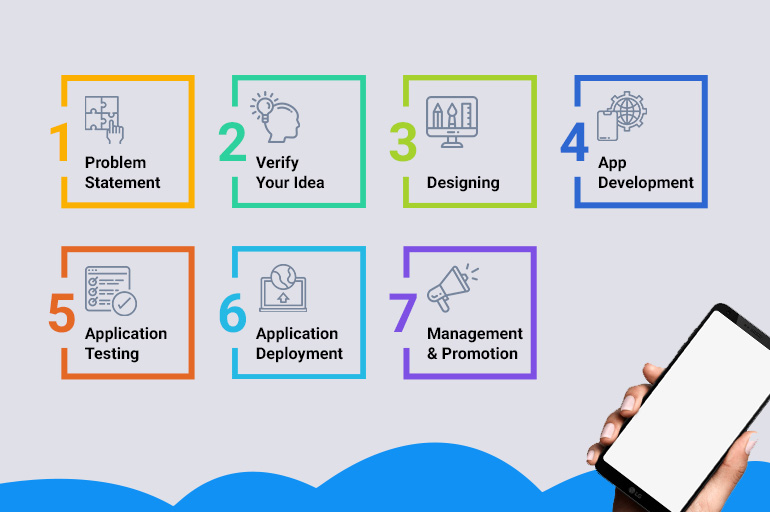I kid you not; most people, when asked about app development, instantly say it is related to programming. However, the reality is far different than that. Mobile app development requires a combination of various skills, including marketing, business, finance, and programming sectors. While your company may have teams for the aforementioned skills, it is not always that they provide the same quality as a professional mobile app development service would.
From conception to completion, developing a mobile app involves several different steps, such as planning, marketing, cross-platform support, design, consultation, testing, maintenance, and optimization.
Trends That Affect App Development Process
No, the number of apps is not the only thing your company should focus on. There are various factors, like how different apps are googled, advertised, and consumed, that can significantly affect any company’s app development process.
Here’s a comprehensive list of the basic four prospects you must consider;
● Internet of Things (IoT):
It represents a worldwide movement in consumer technology in favor of web-integrated services. Today, consumers use internet-connected apps to lock their doors, adjust their thermostats, and start their cars, which has an impact on how new apps are created and utilized.
● 5G Connections:
Mobile services now have better performance due to lower latency owing to 5G connections. They enable app developers to increase the number of features they include without affecting the efficiency of their software.
● Devices:
The devices/OS your apps will be developed for are impacted by mobile device trends, including the emergence of wearable smart devices like smartwatches.
● E-commerce:
Mobile eCommerce has begun to rule certain sectors. Since mobile devices now account for 72.9% of eCommerce sales, planning and creating apps in pertinent industries must include eCommerce functionality and integration.
Key Features For App Development
Now, as a company, you might have a clear mind about the app you are going to develop based on the aforementioned trends. However, the reason why I still believe employing professional mobile app development service is necessary is because of the following technicalities involved;
UI/UX:
Many people undermine the importance of a good UI/UX design. Users seek simplicity, usability, and intuitiveness when they use an app on phones. Making sure the interface design isn’t crowded with pointless functionality is a critical approach to success while designing an app.
Mobile apps with an easy, friendly interface are meant to ace. As a result, you must strive to both forms and maintain relationships with customers by employing an excellent UI/UX service.
Offline Access:
More often than not, people face connectivity issues globally. Especially when a person visits an area that is outside their Wifi and Mobile Data’s coverage, for some types of apps, such as those that offer goods and services, online access is a must.
However, if your company can profit from giving customers offline access, think about using a mobile app development tool to create a native application. An offline access feature is provided via a native app, which uses the phone’s storage.
Device screen responsiveness:
App developers must consider building an app that takes into account the variety of screen sizes. Nowadays, mobile phones are typically larger—almost like mini-tablet. But not everyone prefers smartphones with large screens.
No matter the size of the screen, every user should have the same experience, which makes it a successful mobile app design.
OS Versatility:
Supporting just the operating system when creating an app is a big mistake. Perform market research and determine the platforms that your target audience prefers before comparing mobile app development services.
It is better to ensure the app works on both Apple and Android smartphones to avoid alienating a portion of your target market.
Primary Services In Mobile App Development
Mobile app development is not an overnight project. So, let’s discuss the different stages of it and what services you will need at these stages;
1. Planning & Strategy:
This should be your first step even if you are 100% sure about your app, and want to build it anyhow. This step takes into account all the what-ifs regarding all fields. You need to be sure that it is viable before wasting any resources on it.
Take into account the objectives of your app. A fitness tracker has distinct objectives than an app for an eCommerce store. The need, issue, or purpose that your app will be created to solve must be included in the plan. Choosing the app’s primary user base is also part of this.
2. Branding:
The step where you conduct market research and see what your target audience does and likes. However, it is not limited to knowing your audience only. Take into account the objectives of your app. A fitness tracker has distinct objectives than an app for an eCommerce store.
This is the step where you choose the logos and set the identity for the app too.
3. UX/UI Design:
The next most important thing is the UI/UX design. This encompasses both its front-end navigation and its back-end functions. To optimize the effects of UX/UI on your consumers’ enjoyment of your app, both require the appropriate infrastructure.
4. Development & Marketing:
The development stage encompasses cross-platform compatibility, budget control, and management, where a mobile app development service is best known. Right after this is done, you need to jump to marketing. In addition to the app’s social network presence, marketing entails the app’s appearance, description, and app store listing.
A mobile app development service provides optimization services for your app to be noticed by the app store’s algorithm.
5. E-commerce Designs:
It’s important to optimize a mobile app for eCommerce design if it integrates with a company’s website. For instance, for retail apps to function at their best, they require security measures, shopping carts, particular menu navigation structures, and more.
A mobile app development service will create user-centric designs that are suited to your app’s specific requirements in order to provide an engaging eCommerce experience.
6. Maintenance:
Businesses must regularly update their mobile apps and conduct additional testing to keep them effective and current. In addition, doing this promotes your app in stores because it is well-maintained.
Note that the Gantt chart for this project varies from company to company, but usually, the order of tasks is the one discussed above. All in all, mobile app development is a complex procedure, and despite knowing much about it, you can’t do justice to it without a professional service provider. However, if you feel confident nevertheless, then it’s worth taking a chance.






